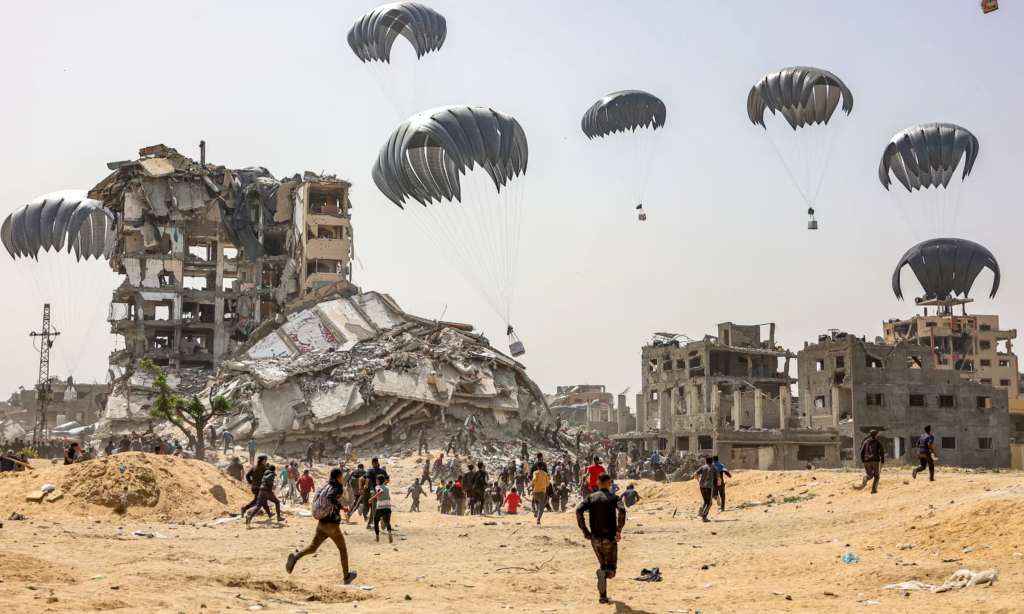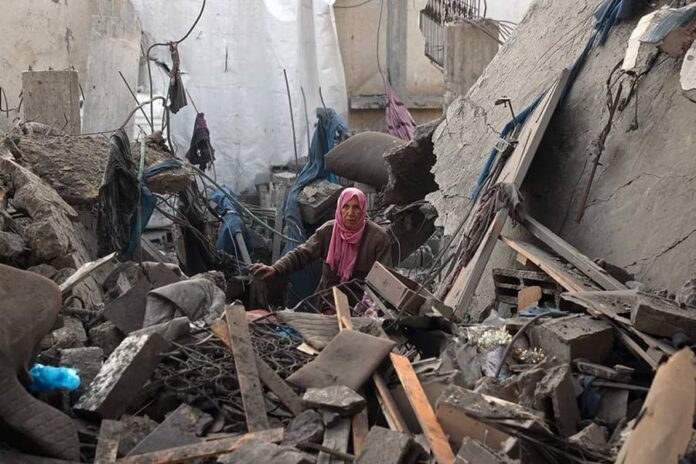In today’s newsletter: With reports of a breakthrough in ceasefire negotiations, a look at what the detail includes – and what its obstacles are
Good morning. After months of false starts, Israel and Hamas are close to agreeing a ceasefire that would involve the release of hostages and a major influx of aid into Gaza. Last night, both sides appeared to have accepted the outlines of a deal, with Reuters reporting that once Israel delivers maps showing how its forces will withdraw from Gaza, Hamas will give its response.
“It’s closer than it’s ever been before,” US secretary of state Antony Blinken said yesterday. “But, right now, as we sit here, we await final word from Hamas on its acceptance, and until we get that word, we’ll remain on the brink.”
Past rounds of talks have also seemed on the brink of success, only to collapse in recrimination – but none have appeared quite this close to the finish line. And Donald Trump is already claiming the development as a success for his looming second term. For today’s newsletter, I spoke to the Guardian’s senior international correspondent, Julian Borger, about how far that’s true, the detail of the prospective deal, and the forces that have sought to derail it. Here are the headlines.
Five big stories
- Economy | UK inflation unexpectedly fell in December, handing some breathing space to the chancellor, Rachel Reeves, after a week of turbulence in financial markets. Figures from the Office for National Statistics showed the consumer prices index eased to 2.5%, below a reading of 2.6% in November.
- UK politics | Tulip Siddiq has resigned as a Treasury minister after accepting the furore over her close ties to her aunt, the ousted prime minister of Bangladesh now accused of corruption, had become a distraction. An investigation found no evidence of wrongdoing but said a lack of records meant that it was not possible “to obtain comprehensive comfort” over properties linked to Sheikh Hasina.
- South Korea | South Korea’s impeached president, Yoon Suk Yeol, has been arrested and is being questioned over his ill-fated declaration of martial law last month, anti-corruption investigators said on Wednesday, bringing to an end an early-morning standoff outside his official residence in Seoul.
- Health | Doctors are proposing a “radical overhaul” of how obesity is diagnosed worldwide amid concerns that a reliance on body mass index may be causing millions of people to be misdiagnosed. Relying only on BMI is “ineffective” because it is not a direct measure of fat and does not provide information about a person’s health, a report by the Lancet commission said.
- Comedy | The comedian and actor Tony Slattery has died aged 65 after a heart attack, his partner has announced. Slattery was known for his improvisations on the popular comedy show Whose Line Is It Anyway?, as well as his appearances on Just a Minute and Have I Got News for You.
In depth: ‘Trump’s return has changed the calculus on Israel’s side’

The proposals on the table now are strikingly similar to those under discussion since last summer. And while it appears that significant progress has been made, it is also true that past negotiations have fallen apart at the last minute in recrimination.
“We have been told that it’s now just a question of dotting the Is and crossing the Ts,” Julian Borger said. “But we have been here before.”
The choreography | A response to pressure from Trump
At the end of last week, Donald Trump’s Middle East envoy, Steve Witkoff, met with the prime minister of Qatar – one of the mediators of the talks – and then Benjamin Netanyahu.
Numerous reports said that Witkoff repeatedly emphasised Trump’s desire to see a breakthrough before he takes office on 20 January. Netanyahu’s office said that at the end of his meeting with Witkoff, he sent senior officials to Doha to accelerate talks.
“There appears to have been a breakthrough overnight on Monday,” Julian said. “We don’t know exactly what that was about. Previously, the speed and extent of Israel’s withdrawal has been a sticking point.”
Both Trump and Joe Biden will seek to take a share of the credit if an agreement finally gets over the line: Biden as the key foreign policy legacy of his one term in office, and Trump as a triumphant start to his second.
But it is clear that Trump’s return has changed the calculus on Israel’s side. “We’ve had at least eight months of counterfactuals,” Julian said. “Because the far right always threatened to bring down Netanyahu, the logic has pointed to no deal. But the imminence of Trump’s return is an X factor here.”
The deal | Hostages exchanged for prisoners and final phase undefined
The Biden administration’s blueprint has always been structured around a three-stage process, with each step intended to build confidence for larger concessions on each side later on.
“This time, there is no detail on phase three,” Julian said. “That means that who will run Gaza after the war is over, and oversee reconstruction, has not been covered.” That may be because of Hamas’s refusal to countenance a future for Gaza in which it does not have a role; it may also be because the Israelis anticipate a more favourable climate for those talks once the Trump administration is in place. Either way, “it seems that it’s been left out to make the first two stages doable”, Julian said.
Here’s what is in the prospective deal, according to a draft seen by Reuters yesterday:
Hostage return: The first stage, lasting 60 days, would see 33 hostages held in Gaza – children, women including female soldiers, men older than 50, the wounded and the sick – freed gradually over a six-week period in return for the release of around 1,000 Palestinian prisoners.
Troop withdrawal: Israel would begin a phased pull-back of its troops and leave parts of the Philadelphi corridor that runs along the border between Gaza and Egypt.
Movement within Gaza: Unarmed residents would be allowed back into north Gaza, and the Rafah crossing between Egypt and Gaza would begin a gradual reopening.
Aid: The Israelis would also start to let more desperately needed humanitarian aid into Gaza. The Associated Press reported that this could be about 600 trucks a day. At the beginning of January, only about 50 aid trucks crossed into Gaza each day, Unrwa said on Sunday.
Second phase: On the 16th day of the first phase, and if everything has gone to plan, talks would start on a second stage that would see more hostages – including male soldiers and younger civilian men – released, as well as the bodies of those who have died in captivity, in return for further Israeli concessions, which the draft suggests could include the “complete withdrawal” of the IDF from Gaza.
“The risk that it falls apart appears to be in the transition from the first to the second phase,” Julian said. “At that point, we will see whether Hamas is prepared to give up the last hostages, who are their only leverage, or if Netanyahu will countenance a larger withdrawal.”
The consequences | Vital aid in Gaza and painful hope for hostage families
It is far too soon for any optimism about Gaza’s reconstruction and stable future administration. But besides the obvious boon for civilians there of a respite from Israeli attacks, the prospect of a rapid increase in the amount of aid being allowed into the territory is crucial.
Last week, the UN Office for the Coordination of Humanitarian Affairs (OCHA) published its most recent situation update, noting that a lack of fuel for electricity generators at hospitals was putting many patients’ lives at risk.
It said that only 16 of 165 attempts to access northern Gaza between October and December were allowed by the Israeli authorities. Only yesterday, at least 35 Palestinians were killed by Israeli strikes.
The wider picture is one of looming famine and the continual threat of IDF attack, with the freezing winter weather only the latest complication for civilians: eight newborns reportedly died of hypothermia in Gaza in less than three weeks, Unrwa said. In this piece with Jason Burke, Malak A Tantesh in Gaza hears from civilians desperate for a deal to be done: “The feeling is very mixed,” photographer Youssef Balousha said. “But the overwhelming feeling is the joy of the end of death and our return to our natural life, which will take many years to restore.”
In Israel, the families of hostages and their supporters are daring to hope that their loved ones may soon be freed – if they are still alive: almost half of the 100 who remain in Gaza are thought to be dead.
In Jerusalem, Lorenzo Tondo reports on a feeling of cautious optimism among the hostages’ families, as well as bitterness about how long it has taken to get this far. “Every day you fear the worst,” Moshe Emilio Lavi – whose brother-in-law, Omri Miran, is among the hostages – said. “Time ran out a long time ago. The international community completely failed. Our government failed by not prioritising their release enough.”
For many months, the single greatest practical impediment to a deal being done has been the influence of two far-right politicians propping up Netanyahu’s fragile coalition, Itamar Ben-Gvir and Bezalel Smotrich.
Ben-Gvir has said he will leave the government if a deal goes through, urging Smotrich to follow suit. Together, they could collapse the government.
“The problem has been that Ben-Gvir and Smotrich have huge leverage,” Julian said. “Lots of people can put pressure on Netanyahu, but only they can really lose him his job. So we might expect that Trump and his people will intervene to put them under pressure to accept it. There is no moderation in their support base, but the far right in Israel is smart enough to know that Trump holds the key to their aims of annexation of the West Bank and settlements in Gaza.
“It’s really striking that Ben-Gvir has now said that he’s repeatedly stopped a deal over the last year,” he added. “He has made it absolutely clear that when Israel pulled out of talks previously, that was because of Israeli politics. That is saying the quiet part out loud.” In May, when talks over a very similar set of proposals broke down as Israel invaded Rafah, the death toll in Gaza stood at about 35,000. Since then, IDF operations have killed about 12,000 more people.
By Archie Bland – theguardian

